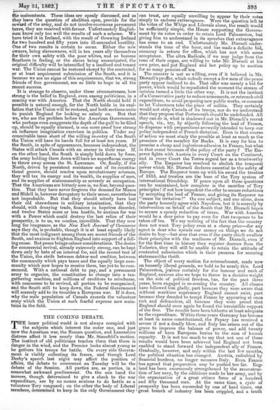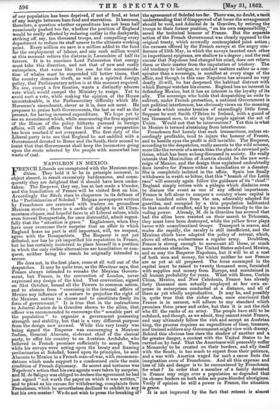THE COMING DEBATE. can trust, are e q ually unwillin g to appear
by their votes simply to endorse extravagance. Were the question left to the votes of the Whigs and Liberals alone, the result would be sufficiently simple, the House supportine. the Govern-. ment by its votes in order to retain Lord Palmerston, but giving him to understand in its speeches that extravagance has come to an end. Unfortunately Mr. Disraeli under- stands the tone of the hour, and has made a definite bid, economy in return for office, which has met with some acceptance. The ultri Radicals, if we may judge from the tone of their organ, are willing to take Mr. Disraeli at his own price, and put England and her policy up to auction for so many pennies off tea. The country is not so willing, even if it believed in Mr. Disraeli's proffer, which nobody except a few men of the peace party appear inclined to do. That offer was merely a bid for power, which would be repudiated the moment the stream of opinion turned a little the other way. It is not the instinct of a Conservative party to reduce armaments, or retrench civil expenditure, to avoid proposing new public works, or consent to let Volunteers take the place of militia. They certainly would not strip Canada of its troops, nor do we understand that they propose that Portsmouth should be undefended. All they can do is, what is shadowed out in Mr. Disraeli's recent speech, viz., try, by abjectly following the lead of Franca,. to dispense with preparations avowedly intended to keep our policy independent of French dictation. Even in that course of action we must study the possible at least as much as the promises of the member for Bucks. It is easy for him to promise a cheap and inglorious adhesion to France, but what in that event becomes of the policy of the party ? The Em.- peror fights with Austria in every Court on the Continent, and in every Court the Tories regard her as a trustworthy ally. The Emperor has resolved to abolish the temporal power which Mr. Disraeli declares essential to the safety of Europe. The Emperor tears up with his sword the treaties of 1815, and treaties are the base of the Tory system of international friendship. If peace upon all these questions can be maintained, how complete is the sacrifice of Tory principles ! if not how impudent the offer to secure reductions by accepting the lead of France, and giving its Emperor no " cause for irritation !" On one subject, and one alone, does the party honestly agree with Napoleon, but it is scarcely by intervention on behalf of the South that Mr. Disraeli hopes to secure a speedy reduction of taxes. War with America would be a dear 'once to pay even for that twopence to be taken off tea. We say nothing of the fact that the country does not want Tory policy even at a cheap price—for any agent is dear who spends our money on things we do not desire to buy—but aver that even if the party chiefs swallow their principles with the readiness of Mr. Disraeli, even if for the first time in history they register decrees from the Tuileries, they will still be unable to retain the attitude of contented submission which is their panacea for securing statesmanlike thrift. The object of every motion for retrenchment, made now on honestly liberal grounds, we hold to be nearly this. Lord Palmerston, jealous certainly for the honour and rank of England, anxious also we hope to throw in a decisive weight on the side of political freedom, has, for the past three years, been engaged in re-arming the country. All classes have followed him gladly, part because they were aware that without maritime supremacy England cannot exist, part because they dreaded to tempt France by appearing at once rich and defenceless, all because they were proud that i England should once again be found the irresistible support of the free. The results have been hitherto at least adequate to the expenditure. Within three years Germany has become at least in name constitutional, the Papacy has received a severe if not a deadly blow, and Italy has arisen out of the grave to improve the balance of power, and add twenty millions of keen European brains to the sum of human capacity. It is not too much to say that not one of these- results would have been achieved had England not been enabled to stand forward the independent ally of France. Gradually, however, and only within the last few months, the political situation has changed. Austria, enfeebled by financial burdens, no longer menaces Italy. Even. France has agreed that preparation may be pushed too far. Eng- land has been enormously strengthened by the reconstruc- tion of her navy, by the additions made to her army, and by the organization of a great citizen force of a hundred and fifty thousand men. At the same time, a cyele of prosperity has been succeeded by one of hard times, one great branch of industry has been crippled, and a tenth Of our population has been deprived, if not of food, at least of any margin between bare food and starvation. It becomes, therefore, a question whether expenditure has not been half consciously pushed too far, whether the position of England would be really affected by reducing outlay in the dockyards, striking off, say, ten thousand troops, and compelling every department to reduce its staff nearer to the ultimate working point. Every million we save is a million added to the fund for the employment of labour, and one such million would at this moment relieve the distress in Lancashire of half its terrors. It is to convince Lord Palmerston that energy must take this direction, and not that of new and costly enterprises, that votes like the one for the accommoda- tion of whales must be suspended till better times, that the country demands thrift, as well as a spirited foreign policy, that Parliamentary action is at this moment required. No one, except a few fanatics, wants a distinctly adverse vote which would compel the Ministry to resign. Yet to avoid such a vote, while making the opinion of the House unmistakeable, is the Parliamentary difficulty which Mr. Horsman's amendment, clever as it is, does not meet. He proposes to praise both Governments, the last as well as the present, for having incurred expenditure. We hope yet to .--see an amendment which, while announcing the firm approval of the House of the policy hitherto pursued in foreign affairs, will still affirm that the limit of wise preparation has been reached if not overpassed. The first duty of the Liberal party is to see that England be not saddled with a Government devoted to Rome and the South, their second to insist that that Government shall keep the locomotive going upon the route selected by the people with somewhat less waste of coal.































 Previous page
Previous page